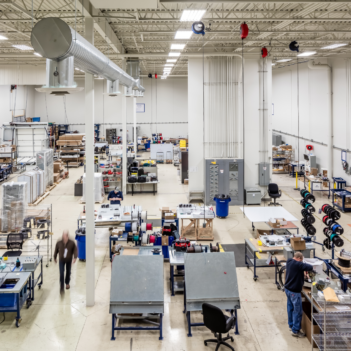News
WHAT IS A PLC? HINT: PROGRAMMABLE LOGIC CONTROLLER
September 19, 2023
In the world of automation and industrial control systems, there’s one component that plays a critical role in managing and controlling complex processes. This component is known as a Programmable Logic Controller (PLC). A PLC is a special purpose computer employed in industrial processes to automate control systems. It is a rugged and reliable piece of hardware designed to withstand harsh industrial environments, making it ideal for use in factories, power plants, assembly lines, and other industrial settings. PLCs are primarily used to monitor and control machinery, equipment, and processes, facilitating efficient and precise operations. From PLC upgrades and installations to fabricating new I/O control panels and wiring, Egan Company is your resource when it comes to unmatched control system integration and engineering expertise.
FUNCTIONALITY AND COMPONENTS
PLCs consist of three primary components: a central processing unit (CPU), input modules, and output modules. The CPU acts as the brain, executing programs and coordinating the communication between inputs and outputs. Input modules are responsible for receiving signals from various sensors and switches, such as temperature sensors, pressure transducers, or limit switches, while output modules are responsible for controlling actuators, such as motors, solenoid valves, or relays. The PLC can also communicate with smart devices such as servo drives and VFDs.
The programming of PLCs is done using specialized software, allowing control engineers to create logic-based programs that define the behavior of the PLC. These programs are typically written using ladder logic, a graphical programming language that represents control circuits in a logical and intuitive manner. Additionally, PLC programming languages can include function block diagrams (FBD), structured text (ST), and sequential function charts (SFC).
PLC ADVANTAGES
PLCs offer several advantages over PC-based control, making them a preferred choice in industrial automation. Some key benefits of using PLCs include:
- Flexibility: PLCs can be easily reprogrammed or modified to accommodate changes in the manufacturing process, making them highly flexible and adaptable.
- Reliability: PLCs are built to operate in harsh environments with high levels of vibration, temperature fluctuations, and electrical noise. Their rugged design ensures reliable performance and reduces the risk of downtime.
- Centralized Control: PLCs enable centralized control of multiple devices, eliminating the need for separate controllers for each machine or process. This centralized approach improves coordination of separate steps of a manufacturing process as well as simplifying troubleshooting.
- Fault Detection and Diagnostics: PLCs provide advanced diagnostic capabilities, allowing for real-time monitoring and detection of faults. This feature aids in proactive maintenance and reduces downtime.
By providing reliable, flexible, and efficient control, PLCs have revolutionized industrial automation. When it comes to control system integration and engineering, Egan Company is your partner. Check out Egan’s Latest PLC Upgrade>



